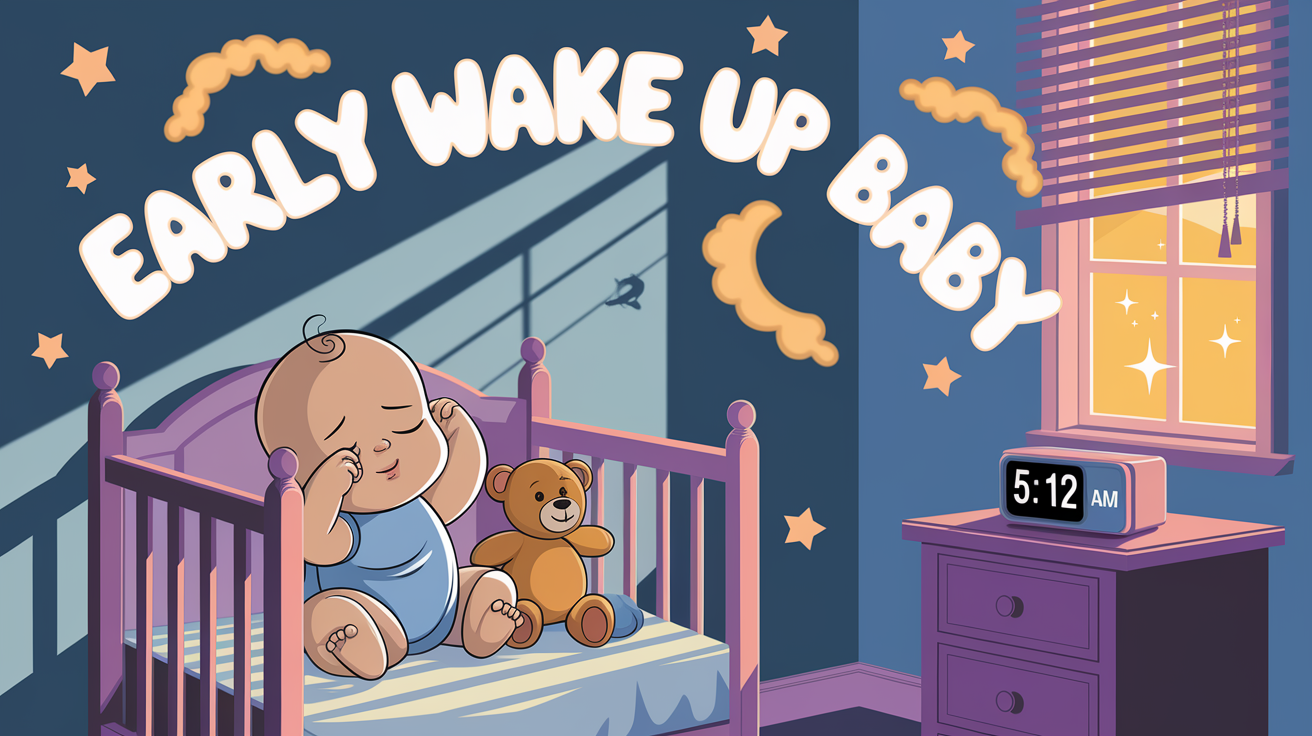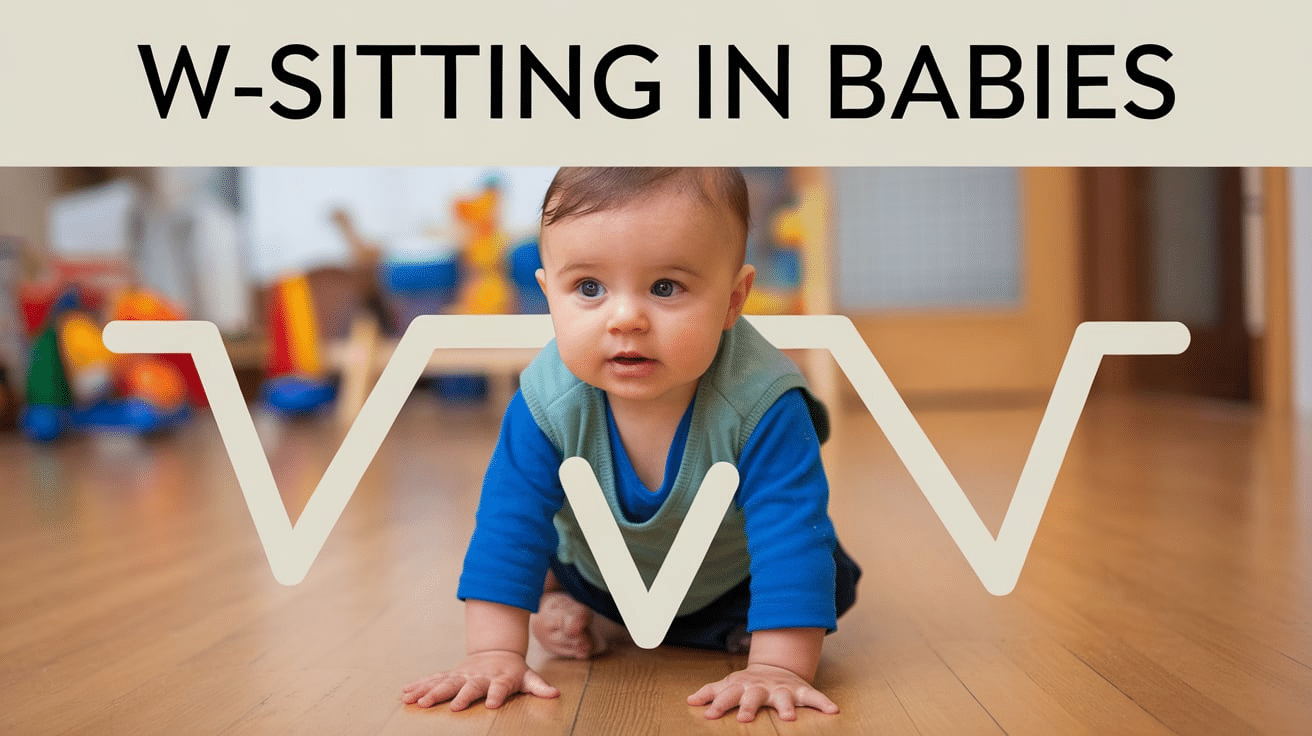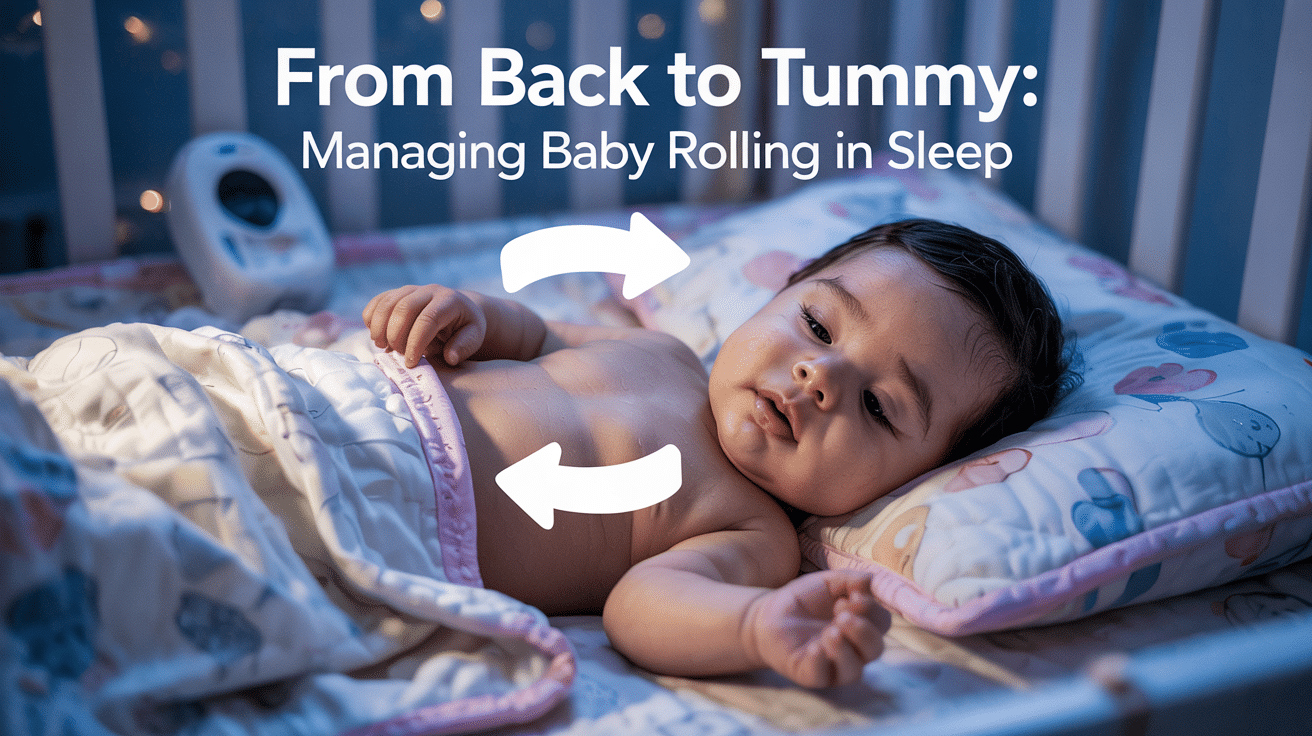
The dreaded 5 AM cry strikes again! Parents worldwide know the pain of early morning baby wakeups all too well.
Those pre-dawn hours can leave both you and your little one tired and cranky for the rest of the day. What makes it worse is feeling like you’re the only one dealing with this challenge.
If you constantly Google ” early wake-up baby,” you’re not alone. This common sleep hurdle affects nearly 40% of babies under 12 months.
Did you know that Babies’ sleep cycles are actually shorter than adults’—about 50-60 minutes compared to our 90-minute cycles! This biological difference means they have more opportunities to wake fully throughout the night and early morning.
Understanding the science behind your baby’s sleep patterns is the first step to helping both of you get the rest you need and deserve.
Why Does My Baby Wake Up So Early?
Many babies naturally wake before dawn due to several factors. Physical needs like hunger, wet diapers, growth spurts, or teething pain commonly trigger early waking, especially in younger infants.
Environmental factors play a significant role, too. Even slight morning light, temperature changes, household sounds, or pet movements can disturb a baby’s light morning sleep.
Baby sleep cycles differ from adults’, with many naturally waking between 5 and 7 a.m. Too-early bedtimes, excessive daytime sleep, or developmental sleep regressions can contribute to dawn wake-ups. Paradoxically, overtiredness often leads to earlier rising.
Solutions include room-darkening curtains, white noise machines, adjusted bedtimes, consistent routines, and ensuring age-appropriate total sleep.
Gentle sleep training and keeping morning interactions calm may also help babies over six months.
Understanding Baby Sleep Cycles

Babies sleep differently than adults. Their sleep cycles last about 50-60 minutes, compared to adult cycles of 90-120 minutes. Newborns spend half their sleep time in light sleep. This explains why they wake up so easily.
Sleep Transitions
Babies often stir or make noises between sleep cycles. Parents who know this can avoid rushing in too quickly. When babies learn to link sleep cycles, they sleep for longer stretches. This skill develops naturally over time.
Gentle support during these transitions can help babies learn to self-soothe. Using a consistent routine signals to babies that it’s time to continue sleeping.
Creating an ideal sleep environment with appropriate temperature and minimal stimulation helps smooth these transitions.
REM Cycles
REM (Rapid eye movement) sleep is when a baby’s brains grow quickly. This stage takes up much more of a baby’s sleep than an adult’s. During REM sleep, babies process what they learned while awake. Their little bodies also release growth hormones.
Watching for signs of tiredness helps parents put babies down at the right time. This timing can make a big difference in how well they sleep.
How to Tell if Early Waking Is a Problem?

Early morning wakings can be normal for some babies, but certain patterns suggest they’re more than just a phase. If your baby consistently wakes up before 6 AM and seems tired or irritable throughout the day, this may indicate a sleep issue.
Watch for signs like shortened daytime naps, increased fussiness, or difficulty falling back asleep independently. These behaviors often point to underlying sleep challenges rather than normal development.
Some early waking is temporary, especially during developmental milestones or seasonal time changes. In these cases, maintaining consistent routines usually helps babies return to normal sleep patterns within a week or two.
However, persistent early waking that affects your baby’s mood and daytime functioning may require intervention. Consider adjusting bedtime, nap schedules, or sleep environment factors like light and noise to help establish more appropriate wake times.
Top Reasons for an Early Wake Up Baby
| REASONS | WHAT’S HAPPENING | WHAT CAN YOU DO |
|---|---|---|
| Too Bright, Too Early | Morning light signals wake time to your baby’s brain. | Use blackout curtains to keep the room dark until it’s time to wake. |
| Nap Trap | Too much or too little daytime sleep can throw off morning rhythms. | Find the right nap balance based on your baby’s age and activity level. |
| Schedule Shuffle | Late naps or early bedtimes may lead to a 5 AM start. | Adjust nap times and push bedtime slightly later if needed. |
| Hungry Tummies, Early Rumbles | Growth spurts or long gaps between feeds can cause early hunger. | Try a dream feed or a more filling bedtime feeding. |
| Milestone Mischief | New skills like crawling or standing spark early-morning practice. | Give them plenty of daytime floor time, and keep the room boring during wake-ups. |
Baby Sleep Tips: Helping Your Little One Sleep Later

Getting your baby to sleep later in the morning can make your household schedule more manageable. A few simple changes to your baby’s sleep routine can help them extend their morning rest time.
Start by setting a slightly later bedtime, moving it by 15-minute increments over several days. This gradual shift helps their body clock adjust without causing overtiredness.
Create the right sleep setting with room-darkening shades to block early morning light. Adding steady background sounds can mask disruptive noises that might wake your baby too early.
Pay attention to daytime naps, as too much daytime sleep can affect morning wake times. Make sure your baby gets enough to eat before sleeping, as hunger is a common cause of early waking.
Consistency matters most—stick with your new routine for at least a week to see results.
Special Tip: Try a calm, quiet playtime 30 minutes before bedtime to ease your baby into a restful sleep.
When to Expect Improvement?

1. Age-Specific Improvements
| AGE GROUP | SLEEP NEEDS | KEY SLEEP CHARACTERISTICS |
|---|---|---|
| Newborns (0–3 months) | 14–17 hours (in short bursts day & night) | Sleep is fragmented and spread across day and night. |
| Babies (3–4 months) | Begin sleeping longer at night | Start consolidating nighttime sleep. |
| Toddlers (1–2 years) | 11–14 hours | May resist bedtime as they gain independence. |
| Preschoolers (3–5 years) | 10–13 hours | Can experience nightmares or bedtime stalling. |
| School-age (6–13 years) | 9–11 hours | Sleep may be affected by school stress, screens, and social life. |
2. Importance of Consistency and Routine
Setting regular sleep and wake times helps train your child’s body clock. Children thrive on predictability, which creates security and comfort.
A calming bedtime routine signals to your child that sleep time is coming. This might include a bath, story time, and quiet talk about the day. Keep the bedroom environment conducive to sleep: dark, calm, and comfortable.
3. When to consult a pediatrician or sleep consultant
Seek professional help if your child shows persistent sleep problems lasting more than a few weeks. Warning signs include chronic fatigue, behavior changes, snoring, or breathing pauses during sleep.
A doctor can check for medical issues like sleep apnea or reflux. Sleep consultants offer personalized plans based on your family’s needs and parenting style.
Most Common Myths About Early Warnings
“Keeping baby up later will fix it.”
Many parents think a later bedtime leads to later mornings. This isn’t true. Overtired babies actually wake earlier and sleep worse.
When babies stay up past their ideal bedtime window, stress hormones increase. These hormones make it harder for them to settle and maintain deep sleep cycles.
“Skipping naps helps them sleep longer.”
Parents often reduce daytime sleep, hoping for longer nights. This strategy backfires consistently. Well-rested babies sleep better overall. Missing naps creates sleep debt that disrupts nighttime patterns.
Babies who skip naps often wake more frequently at night and start their day earlier due to the accumulated sleep pressure.
Understanding your baby’s sleep needs by age creates better outcomes. Following appropriate wake windows between sleep periods helps establish healthy patterns.
Summing It Up
Waking up at 5 AM to a babbling baby can test any parent’s patience. This common issue affects many families but can be overcome with consistent approaches.
Baby sleep patterns develop through careful training and environmental adjustments. Setting a regular bedtime routine helps establish healthy sleep habits.
Room-darkening curtains can prevent dawn light from signaling to your baby that it’s time to start the day, and white noise machines may block disruptive sounds that cause early stirring.
Checking whether hunger plays a role could reveal simple fixes. Some babies need a slightly later bedtime or an adjusted feeding schedule.
With time and steady effort, early morning wake-ups will become less frequent. Many parents find success within a few weeks of applying these straightforward techniques.
If you’re interested in more informational content on mothers and babies, feel free to click here and explore other blogs that you might enjoy.




















